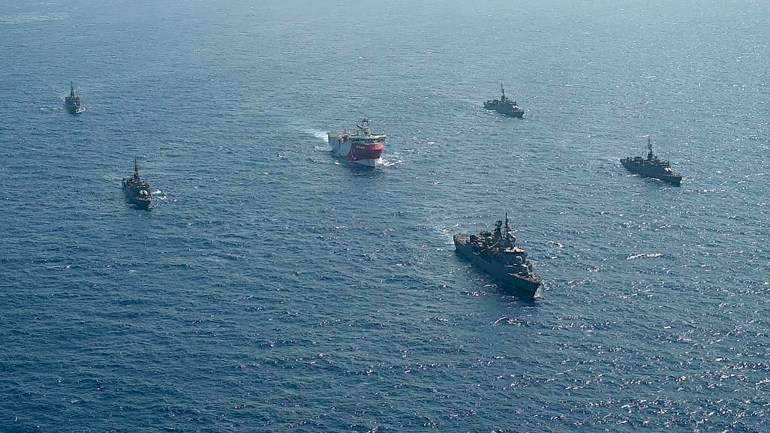Turkey: Erdogan denounces ‘threats and blackmail’ over sea rights
Turkish president says he sees a ‘win-win’ solution, but says Ankara will not bow to ‘threats’ over rights in eastern Mediterranean Sea.

President Recep Tayyip Erdogan said Turkey will not “bow down to threats and blackmail” in a row with Greece over undersea resources as a European Union summit tackles the dispute this week.
Any plans or maps excluding Ankara from its rights in the eastern Mediterranean Sea were unacceptable, Erdogan said on Monday.
Keep reading
list of 3 itemsTurkey extends exploration in disputed Mediterranean waters
Greece, Egypt seek Biden role in eastern Mediterranean dispute
“I am calling on all neighbouring countries in the Mediterranean, especially Greece, not to see this issue as a zero-sum game,” the Turkish president said. “I believe a win-win formula that observes everyone’s rights could be found.”
NATO ally and EU candidate Turkey claims gas resources that are also contested by Greece and Cyprus – a dispute that has fanned territorial rows over maritime boundaries.
Turkey rejects the maritime boundary claims of Greece and the Greek Cypriot administration, saying Ankara is in favour of resolving all issues through international law.
European foreign ministers discussed potential measures against Turkey at a meeting on Monday before an upcoming summit on Thursday and Friday on the dispute.
Not all EU members are convinced sanctions would work, however, with some fearing the escalating standoff could see Erdogan’s government again allow asylum seekers to leave Turkey and cross into the bloc.
“Unhappily, we haven’t seen much progress or improvement since the last European Council,” the EU’s top diplomat Josep Borrell told reporters on Monday, referring to an October 1-2 summit on the issue.

Erdogan’s call
In his remarks, Erdogan reiterated a call to gather “all the actors around the table” including the self-declared Turkish Republic of Northern Cyprus.
German Foreign Minister Heiko Maas said on Monday the EU must continue dialogue with Turkey.
Tensions flared in August when Ankara sent a survey vessel, the Oruc Reis, to map out energy drilling prospects in waters also claimed by Greece. Ankara and Athens agreed to resume talks over their contested maritime claims in September, ending a four-year hiatus.
However, Greece has since said it would not start negotiations as long as Turkish vessels were in contested waters.
Turkey has extended the duration of the vessels’ exploration multiple times since August, but last month ordered the Oruc Reis back to port.
Emre Gonen, a political scientist at Istanbul Bilgi University, said it was unclear whether the EU would find consensus over the issue.
“Turkey protects its legitimate rights in the eastern Mediterranean, but a solution should be sought on a negotiating platform. Should the tensions rise further, the EU can’t produce a solution,” said Gonen.